- Home
- Victor Pelevin
A Werewolf Problem in Central Russia and Other Stories Page 3
A Werewolf Problem in Central Russia and Other Stories Read online
Page 3
“Are there many werewolves in the army?” Sasha asked, without really knowing why.
“Yes,” answered the Colonel.
“Have they been there for long?”
They leapt high, flew over a long puddle and went racing on.
“From the very beginning,” barked the Colonel, “how d’you think we drove the Whites all the way across Siberia?”
He gave a series of short growls rather like chuckles and moved ahead, his tail raised high like a flag on the stern of a ship. The plaster watchman hurtled past them, followed by the sign for the “Michurin Collective Farm,” and there in the distance were the sparsely scattered lights of Konkovo. The village had prepared itself well for the encounter. It was like a ship consisting of several watertight compartments. When night came to the streets, of which there were only three, an impenetrable darkness descended, the houses’ hatches were firmly battened down, each maintaining the yellow electric gleam of rational life in isolation from the others. Konkovo met the werewolves with a yellow glow behind curtained windows, silence, empty streets, and a series of entirely autonomous human dwellings: there was no village any longer—only a few spots of light in the midst of the darkness covering the world. The long gray shadows rushed along the main street and circled in front of the club as they abandoned the momentum of their run. Two wolves separated from the pack and disappeared among the houses, while the rest remained sitting in the square. Sasha stayed in their circle and stared at the club building where only recently he had intended to spend the night. He turned to Lena:
“Lena, where have they...”
“They’ll be back in a minute,” she interrupted. “Shut up.” The moon had gone behind a long tattered cloud, and now the square was only lit by a single lamp under a tin cone that swayed in the wind. Looking around, Sasha found the scene sinister and beautiful: the steel-gray bodies sat motionless around an empty space like an arena, the dust raised by the wolves was settling, their eyes and fangs were gleaming. The humans’ little painted houses with the TV aerials and chicken houses stuck to them and the crooked parthenon of the club building seemed less like a stage set for the reality which had focused itself in the center of the square than a parody of a stage.
Several minutes passed in motionless silence, then something moved out of a side alley on to the main street and Sasha saw the silhouettes of three wolves trotting towards the square. He knew two of them—Ivan Sergeievich and the Colonel—but the third was unknown to him. Sasha sniffed his scent, full of putrid self-satisfaction and at the same time fear, and he wondered who it could be.
As the wolves approached, the Colonel dropped back a little, before running up and knocking the third wolf into the ring with his chest. Then he and Ivan Sergeievich took the places that had been left for them. The circle was completed and the stranger was left in the center. Sasha took a good sniff at him. The impression he received was like that of a man of about fifty with a body shaped like a broad-based cone and a fat, insolent face—but somehow at the same time very lightweight, as though filled with air. The newcomer peered at the wolf who had shoved him from behind and said with uncertain humor:
“So Colonel Lebedenko’s pack is all present and accounted for. But what’s all the drama about? Why this circle in the night?”
“We want to have a word with you, Nikolai,” their Colonel answered.
“Glad to oblige,” howled Nikolai. “Any time—for instance, we could talk about my latest invention. I call it the soap bubble game. You know I’ve always been fond of games, and just recently...”
Sasha suddenly realized that he was not following what Nikolai said, but the way he said it—he spoke rapidly, so that his words tumbled over each other, and he seemed to be using the words to defend himself from something which he found extremely unpleasant—as if the thing was scrambling up the stairs and Nikolai (for some reason Sasha imagined him in his human form), standing on the landing, was throwing everything that came to hand at it.
“...to create a smooth and shiny model of what is happening.”
“What’s the point of the game?” asked the leader of the pack. “Tell us. We like games too.”
“It’s very simple. You take a thought and you blow it up into a soap bubble. Shall I show you?”
“Yes, show us.”
“For instance...” Nikolai thought for a moment. “For instance, let’s take something close at hand: you and I.”
“Us and you,” echoed the leader.
“Right. You’re sitting around me and I’m standing in the center. That’s what I’m going to blow into a bubble. And so...”
Nikolai lay down on his belly and assumed a relaxed pose.
“And so, now you’re standing and I’m lying in the center. What does that mean? It means that certain aspects of the reality drifting past me can be interpreted in such a fashion that I, having been dragged from my home in a somewhat crude fashion, appear to have been brought here and set in the center of a circle of what are apparently wolves. Perhaps I’m dreaming it, or perhaps you’re dreaming it, but one thing is certain: something is going on. Now, we’ve skimmed the surface and the bubble has begun to inflate. Let us turn to the more subtle fractions of the current event and you will see what delightful colors start playing on its thinning walls. I can see from your muzzles that you’ve come with the usual collection of stinging reproaches. I don’t have to listen to you, I know what you’re going to say. That I’m not a wolf but a pig—I eat off the garbage dump, live with a mongrel bitch, and so on. You think that’s debased. And you think your crazy obsessive activity is exalted. But now the walls of my bubble reflect gray bodies that are absolutely identical—any of yours and mine—and they reflect the sky—and honestly, looking down from there a wolf and a mongrel and everything they do look very much the same. You run in order to get somewhere and I lie among a pile of old newspapers on my dump—how trifling the difference is in essence! What’s more, if we take your state of motion as the starting point—note this, now!—it turns out that in fact I am running and you are simply jumping up and down on the spot.” He licked his lips and continued:
“Now the bubble is half-ready. Next we come to your major complaint against me: I break your laws. Note that: your laws, not mine. But if I am bound by laws, they are of my own making, and I believe that is my right—to choose which authority to submit to and in what way. You are not strong enough to allow yourselves that, but in order not to seem like idiots in your own eyes, you convince yourselves that the existence of individuals like me can harm you.”
“You’ve hit the nail on the head there,” the leader observed.
“Well now, I don’t deny that, hypothetically speaking, I could cause you a certain degree of inconvenience. But if that does happen, why should you not regard it as a kind of natural calamity? If a hailstorm starts, surely instead of remonstrating with it, you try to take shelter. And am not I—from the abstract point of view—a natural phenomenon? In fact, it turns out that in my piggishness, as you call it, I am stronger than you are, because I don’t come to you, but you come to me. That’s another given. See how the bubble is growing. We just have to give it a final puff of air. I’m fed up with these nocturnal visits. It wasn’t so bad when you came one at a time, but this time the whole pack has turned up. But now that it’s happened, let’s get things clear between us once and for all. What can you actually do to stop me? Nothing. You can’t kill me—you know why yourselves. As for changing my mind—you simply haven’t got the brains to do it. So what’s left is just your word and mine, and on the walls of the bubble they are equal. Only mine is more elegant—though, in the final analysis that’s a matter of taste. In my view, my life is a magical dance and yours is a senseless dash through the darkness. So wouldn’t it be best for us to go our separate ways as quickly as possible? There, the bubble has separated now, it’s flying. How do you like it?”
While Nikolai was howling, gesticulating with his tail and his left forepaw,
the leader listened to him without speaking, looking down into the dust and occasionally nodding. Having heard Nikolai out, he slowly raised his muzzle and at that very moment the moon came out from behind a cloud, and Sasha saw its light gleam on the leader’s fangs.
“Nikolai, you obviously think you’re performing for stray dogs at the dump. I personally have no intention of arguing about life with you. I don’t know who has been to visit you,”—the leader glanced around at the other wolves—“that’s news to me. We’re here on business.”
“On what business?”
The leader addressed the circle.
“Who has the letter?”
A young she-wolf came out of the circle and dropped a rolled piece of paper from her jaws. The leader straightened it out with a paw that just for a moment became a human hand and read:
“‘Dear Editor...’”
Nikolai, who had been wagging his tail, now dropped it into the dust.
“‘This letter comes to you from one of the women of Konkovo. Our village is not far from Moscow, and the full address is shown on this envelope. I don’t mention my name for reasons which will be clear from what follows. Recently there has been a series of articles in the press about phenomena which science previously dismissed out of hand. I wish to inform you of a remarkable phenomenon which from the scientific point of view is much more interesting than the phenomena which have been attracting so much attention, such as x-ray vision or Assyrian massage. You might take what I have to tell you as a joke, so let me tell you straight off that it is not. You have probably come across the word “werewolf” more than once, in the sense of a human being who can turn into a wolf. The point is that there is a real natural phenomenon behind the word. You could call it one of the most ancient traditions of our homeland, one which has miraculously survived all of the trials of the years of oppression. Our village is the home of Nikolai Petrovich Vakhromeiev, a man of great modesty and kindheartedness, who possesses this ancient knowledge. Probably only he can tell you what the essential nature of the phenomenon is. I myself would never have believed such things were possible if I had not accidentally witnessed how Nikolai Petrovich turned into a wolf and saved a little girl from a pack of wild dogs...’”
“Is this all lies, or have you been conspiring with your old buddies?” the leader asked, interrupting himself.
Nikolai said nothing, and the leader carried on reading:
“‘I gave Nikolai Petrovich my word that I wouldn’t tell anyone about what I had seen, but I am breaking my promise because I believe that this remarkable natural phenomenon should be studied. Because of the promise I cannot give you my name, and I ask you please not to tell anyone about my letter. Nikolai Petrovich himself has never told a lie in his life and I do not know how I shall ever look him in the face if he finds out. I confess that apart from a desire to assist the development of our science I do have another motive. Nikolai Petrovich lives in very poor circumstances, with no income but a meager pension, which he generously shares with all comers. Although Nikolai Petrovich himself regards this side of life as entirely unimportant, I make bold to assert that the value of his knowledge for all of humanity is so great that he should be provided with quite different conditions. Nikolai Petrovich is such a kind and considerate man that I am sure he would not refuse to cooperate with scientists and journalists. I can tell you the small amount of information that Nikolai Petrovich has given me in our conversations—in particular several historical facts...’”
The leader turned the letter over.
“Now... nothing interesting here... rubbish... what’s Stenka Razin got to do with it? ... where is it now... ah, here it is: ‘Incidently, it is an insult that a foreign word is still used for a fundamentally Russian concept. I would prefer the word werevolk—the Russian root indicates the origin of the phenomenon and the romance prefix sets it in the general European cultural context.’
“That final phrase,” said the leader, “makes it perfectly clear that the kind and considerate Nikolai Petrovich and the anonymous inhabitant of Konkovo are one and the same.”
For several seconds there was silence. The leader tossed the piece of paper aside and looked at Nikolai.
“They’ll come here,” he said sadly. “They’re quite stupid enough to do that. They might have been here already if Ivan hadn’t seen the letter. But you sent it to other journals as well, didn’t you?”
Nikolai slammed his paw down into the dust.
“Listen, what’s the point of all this hot air? I do what I think is right, there’s no point in trying to change my mind, and I must confess that I don’t much care for your company. So let’s leave it at that.” He raised his belly from the earth, as if to stand.
“Wait! Don’t be in such a hurry. It’s sad, but it looks as though your magical dance on the dump is about to come to an end.”
“What does that mean?” asked Nikolai, pricking up his ears.
“Just that soap bubbles have a habit of bursting. We can’t kill you, it’s true. But take a look at him.”
“I don’t know him,” yelped Nikolai. He looked down at Sasha’s shadow. Sasha also looked down and his head spun with the shock: all the others had the shadows of humans, but he had the shadow of a wolf.
“He’s new. He can take your nominal place in the pack if he defeats you. What do you think of that?” The leader’s final question was phrased in obvious mimicry of Nikolai’s typical bark.
“It seems you’re quite a specialist on the ancient laws,” Nikolai replied, attempting an ironical growl.
“Like yourself. Aren’t they the commodity you intend to trade in? But you’re not so clever. Who’s going to pay you? Most of what we know is of no use to anyone.”
“That still leaves something,” Nikolai muttered, probing the circle with his gaze. There was no way out—the circle was closed. Sasha finally understood the meaning of what was happening: he would have to fight with this fat old wolf.
“But I only ended up here by accident,” he thought. “I didn’t hear any call—I don’t even know what it is!”
He looked around—all eyes were fixed on him. “Maybe I should tell them everything? They might let me go...”
He remembered his transformation, and then the way they had raced through the dark forest and along the road: it was the most beautiful thing he had ever experienced. “You’re nothing but an impostor. You haven’t got a chance,” said a familiar voice inside his head. But at the same moment a different voice—the leader’s—said:
“Sasha, this is your chance.”
He was about to confess everything, but his paws stepped forward of their own accord and he heard a voice hoarse with excitement bark:
“I’m ready.”
He realized that he had said it and immediately felt calm. The wolf in him had taken control of his actions—he no longer had any doubts. The pack growled in approval. Nikolai slowly raised his dull yellow eyes to look at Sasha.
“Remember, my young friend, that it’s only a very small chance,” he said. “Very small indeed. It looks as though this is going to be your last night.”
Sasha didn’t reply. The old wolf lay on the ground in the same position.
“We’re waiting for you, Nikolai,” the leader said quietly.
Nikolai yawned lazily—and suddenly leapt into the air. His legs, rapidly straightening, threw him upwards like a spring, and when he struck the ground again there was nothing left in him of the old tired dog—this was a real wolf, filled with calm ferocity: his neck was tensed and his eyes stared right through Sasha. Once again a growl of approval ran through the pack. The wolves discussed something rapidly: one of them ran over to the leader and put his muzzle close to his ear.
“Yes,” said the leader, “definitely.” He turned to Sasha. “Before the fight there should be an exchange of insults. The pack desires it.”
Sasha yawned nervously and glanced at Nikolai, who set off around the circle without taking his eyes off some objec
t located just beyond Sasha—then Sasha also set off along the living wall, following his foe. They walked around the circle several times and then stopped.
“Nikolai Petrovich, I find you repulsive,” Sasha managed to squeeze out.
“You can tell that to your daddy,” Nikolai replied readily. Sasha felt the tension slip away.
“Why not,” he said, “at least I know who he is.”
He thought that was a phrase from an old French novel—it would have been more appropriate if the moonlit bulk of Notre Dame had been towering up behind him, but he couldn’t think of anything better.
“I must keep it more simple,” he thought, and asked:
“What’s that wet spot under your tail?”
“That’s where I smashed out the brains of a kid called Sasha,” Nikolai growled. They started off again, along a slowly narrowing spiral, facing each other all the while.
“I suppose all sorts of things probably happen at the dump,” said Sasha. “Don’t you find the smells there irritating?”
“I find your smell irritating.”
“Be patient. It’ll pass—soon you’ll be dead.”
Nikolai stopped. Sasha stopped too and screwed up his eyes against the painful glare of the street lamp.
“Your stuffed body,” Nikolai said softly, “will stand in the local secondary school next to the globe and they’ll use it for the ceremony when children join the Pioneers.”
“Enough,” said Sasha, “let’s finish on a more intimate note. Do you like Yesenin, Nick?” Nikolai replied with an obscene variation of the deceased poet’s name.
“That’s wrong of you. I can remember a quite remarkable line: You whine like a bitch in the moonlight. Good isn’t it, terse yet expressive...”
Nikolai Petrovich pounced.
Sasha had not the slightest idea of what a werewolf fight was like, but everything became clear in the course of events. While he and his opponent were walking around the circle and insulting each other, he had realized that the idea was not just to amuse the pack, but to allow the opponents to take a good look at each other and choose the moment to attack. He had made a mistake in getting carried away by the exchange of insults and his opponent had jumped at him while he was blinded by the light of the street lamp.

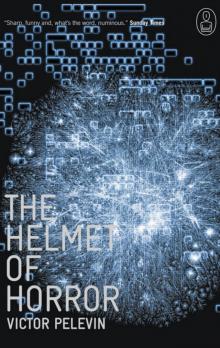 The Helmet of Horror
The Helmet of Horror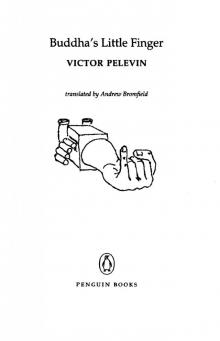 Buddha's Little Finger
Buddha's Little Finger Empire V
Empire V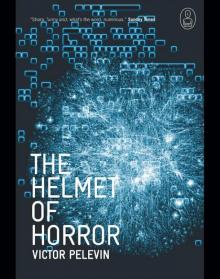 Helmet of Horror
Helmet of Horror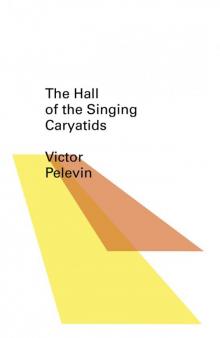 The Hall of the Singing Caryatids
The Hall of the Singing Caryatids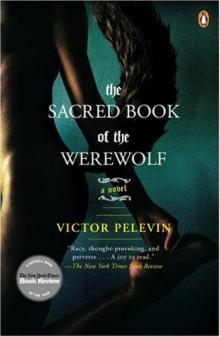 The Sacred Book of the Werewolf
The Sacred Book of the Werewolf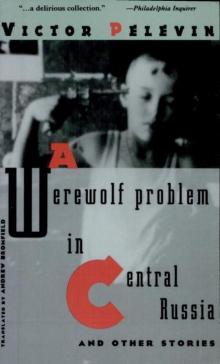 A Werewolf Problem in Central Russia and Other Stories
A Werewolf Problem in Central Russia and Other Stories